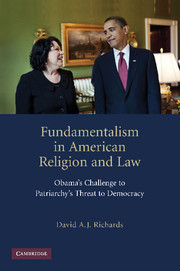Book contents
- Frontmatter
- Contents
- Acknowledgments
- FUNDAMENTALISM IN AMERICAN RELIGION AND LAW
- Introduction: Defining the Problem
- 1 The Progressive Recognition of Human Rights under American Constitutional Law
- PART I FUNDAMENTALISM IN LAW
- PART II FUNDAMENTALISM IN RELIGION
- 4 Fundamentalism in Roman Catholicism
- 5 Fundamentalism among Protestants
- 6 Mormon Fundamentalism
- PART III FUNDAMENTALISM IN LAW AND RELIGION
- Conclusion: Patriarchy as the American Dilemma: Facing the Problem of Fundamentalism at Home and Abroad
- Bibliography
- Index
- References
5 - Fundamentalism among Protestants
Published online by Cambridge University Press: 04 May 2010
- Frontmatter
- Contents
- Acknowledgments
- FUNDAMENTALISM IN AMERICAN RELIGION AND LAW
- Introduction: Defining the Problem
- 1 The Progressive Recognition of Human Rights under American Constitutional Law
- PART I FUNDAMENTALISM IN LAW
- PART II FUNDAMENTALISM IN RELIGION
- 4 Fundamentalism in Roman Catholicism
- 5 Fundamentalism among Protestants
- 6 Mormon Fundamentalism
- PART III FUNDAMENTALISM IN LAW AND RELIGION
- Conclusion: Patriarchy as the American Dilemma: Facing the Problem of Fundamentalism at Home and Abroad
- Bibliography
- Index
- References
Summary
Protestant fundamentalism in the United States must be understood within the larger framework of the distinctive history and culture of the Protestant churches in contrast to Roman Catholicism. Only when we are quite clear about this larger framework can we both understand and critically assess such fundamentalism, as it both arises very much within that framework and yet incoherently questions and abandons what has made that framework so valuable not only as an interpretation of Christianity but also in the historical growth and development of the principles and institutions of constitutional government, including the argument for toleration. I begin with a discussion of this larger framework and then turn to the nature of the claims that fundamentalism makes within this framework. My critique then examines closely various dimensions of its internal incoherence (including its lack of attention to the life and teachings of Jesus of Nazareth) and its substantive unreasonableness. I then offer a diagnosis of its roots in a reactionary patriarchal culture and psychology.
PROTESTANTISM AND CONSTITUTIONAL DEMOCRACY
Human culture, which had been oral, was transformed by the emergence of literacy and written texts. The very capacity to think of oneself as part of a culture is delimited not by the exigencies or oral memory but by the written texts that today preserve the content of the culture.
- Type
- Chapter
- Information
- Fundamentalism in American Religion and LawObama's Challenge to Patriarchy's Threat to Democracy, pp. 153 - 192Publisher: Cambridge University PressPrint publication year: 2010

